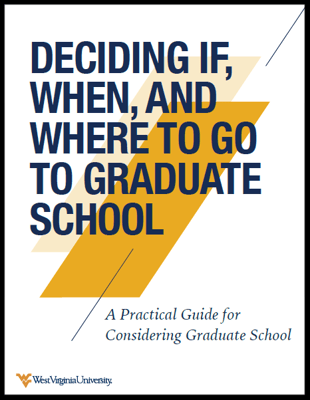
When you're choosing a graduate school and everyone tells you to find a program that’s a “good fit” for you. But what does that mean? And how do you do it?
In simple terms, choosing a graduate school that's a good fit for you means finding a program and place where you will be happy during the next two to seven years of your life while you complete your advanced degree. There are a number of variables that go into the equation of a good fit: including faculty, current students, location, cost, and facilities.
Let's dive into 7 of the steps to take when you are figuring out how to find a graduate program that's right for you.
1. Take your time when researching graduate schools.
Allow yourself enough time to research this big life decision. Plan on six to ten months of research and exploration to find the schools to which you will apply for admission. Not only is grad school a huge investment of time and money, but it will also be the center of your life for several years.
Further, programs can be extremely competitive, so if you are determined to start a program during the next admission term, apply to at least two schools so you have a fallback option if you don’t get into your first choice.
2. Get in touch with the admissions team.
Now consider the admissions call test. Think of one question you haven’t been able to find on the schools’ websites and call the admissions office to ask that question. Use the same question for all of your finalist schools. See how long it takes to get a response, as well as how helpful the people you talk to are. How varied are the answers among the different schools? This exercise should help you narrow your choice down to a final three!
3. Prioritize what matters to you most about grad school.
Thoughtfully rank the importance of each criteria you’re using to decide. Is cost the most important consideration? Does pursuing a degree in an urban or rural area matter to you? Or is attending a school that's dedicated to research your main priority? (By the way, West Virginia University is one of the few R1 institutions in the nation and the only R1 institution in the state of West Virginia, which means we're dedicated to real, innovative research.)
Come up with five to seven ranked criteria and use them to rate the 15 schools you listed for consideration. Apply that criteria to reduce your pool of possible schools to 7 or 8.
4. Check to see if your school of interest offers graduate assistantships.
Graduate assistantships provide students with the opportunity to augment their educational experience by giving them the opportunity to reach a deeper level of subject comprehension. Students can then apply the skills they enhance and the knowledge they gain in — and beyond — the classroom.
That said, you can use your graduate assistantship to see your area of study from a range of new perspectives, gain deeper insight into your field, and choose where you want to focus on a particular area of study. If pursuing a graduate school that offers positions for graduate assistants, be sure to inquire as to whether graduate students typically find a graduate assistantship related to their field of study.
5. Ask about financial aid opportunities.
Prioritize the time to fill out financial aid forms — you've got nothing to lose (except a little debt!).
There are plenty of financial aid options for graduate students, so be sure to check with your school of interest to see what your options will be for financing graduate school. We recommend starting by filling out the FAFSA form. By the way, even if you don’t qualify for need-based financial aid, you very well might qualify for merit-based financial aid from the university. And to be considered for this, you still need to fill out the FAFSA paperwork.
6. Making visiting graduate schools a strategy.
Time to hop in the car or on the plane because what looks good on a website may not look so good in person. Furthermore, promotional materials can’t give you a feel for the atmosphere and overall culture of a school. Make sure you ask to speak with faculty whose research interests you. Ask for time to meet with current graduate students in the program and have candid questions prepared to ask them about their level of satisfaction there.
Before you leave, ask for contact information of a recent graduate you can call and talk to about how the job search has gone post-graduation. If the admissions personnel are uncomfortable giving you a resource like this, take note of this red flag.
7. Don't limit yourself to one or two graduate schools.
Make a list of 15 to 20 schools offering your graduate program of interest. Don’t just focus on schools highly ranked in the program you have chosen. You can have those schools on your list, but don’t limit yourself to them. Remember that a highly ranked program or school doesn’t guarantee your happiness. While some outside source may have ranked the program highly based on specific criteria, it may be very different criteria that would make you happy while pursuing a graduate degree.
Ready to join a community of change makers at WVU?
While it is important to prepare and position yourself as a competitive candidate for graduate school, it is just as important to take your time and research your various options for graduate education. This investment will serve you well as you search for that “good fit” for the next chapter of your education.
We hope you'll request more information today! Also, if you have questions about the below topics, we have resources to help!
-
Securing a graduate assistantship
-
Pursuing an advanced STEM education
-
Getting a graduate degree in public health
-
Making a career change
-
Enrolling in graduate school online
-
Doing research at R1 institutions
Download WVU's Graduate School Decision Guide to learn more about choosing a graduate school that's right for you!











